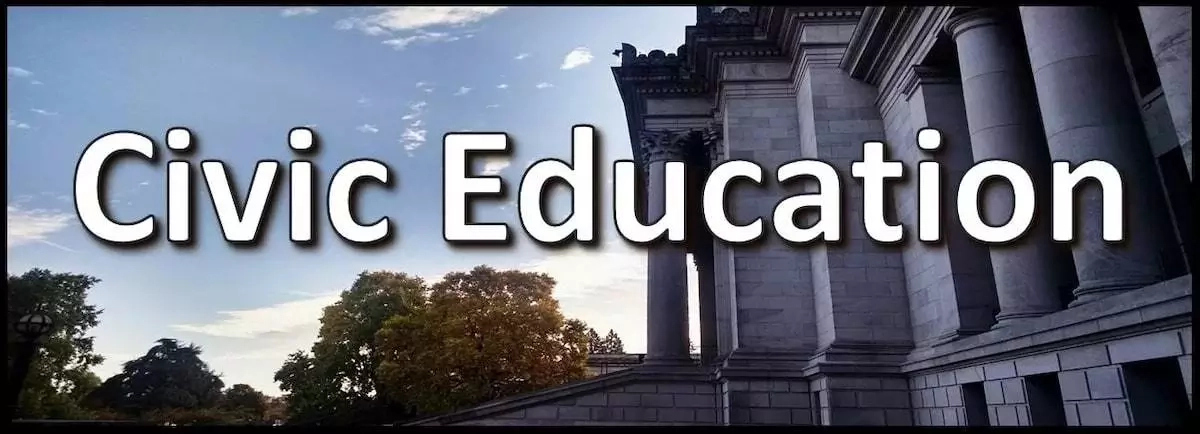Education
Definition Of Civic Education In Nigeria
Here in this post, we are going to share with you the definition of civic education In Nigeria. We hope you find this information useful and educating.
What is Civic Education?
Civic education is a public, as well as, socially oriented continuing education for upbringing, with the objective of building civic competence, and democratic culture, as well as, satisfying the desires to socialize in the interests of the individual citizen, and civil society as well as the rule of law.
Read Also: 5 Importance of Civic Education in Nigeria

As the title of this article implies, my job, therefore, is to look at the definition of civic education. It is also noteworthy at this point to mention that, civic education encompasses the importance of civic education within the Nigerian society. Having said that, let us now find out the importance of civic education in present modern Nigeria.
The Goal Of Civic Education:
What then is the goal of civic education? From research, the primary goal of civic education can simply be considered as the inculcation, or the formation of civil qualities in Nigerian citizens on the basis of new knowledge, and new skills and new values that actually help citizens to solve emerging problems, and also adapt to changing socio-economic and political situation, and represent as well as, protect their individual rights and their interests.
Other civic qualities that civic education has imparted into the citizens include, the respect accord to the interests and the rights of their fellow citizens.
Components Of Civic Education:
If civic education must be well defined, then the components of this aspect of education must be taken into consideration. Now that out of the way, what then are the components of civic education? However, these components include:
-
Human rights education and
-
Teaching a culture of peace and
-
Education of tolerance and
-
Development of intersectoral social partnerships and
-
Management of self-governing associations of citizens
Read Also: Importance Of Citizenship Education In Nigeria
Having said that, the main groups in the Nigerian society, where civic education is actually targeted at are:
- school children and
- students; and
- teachers; and
- military and
- security forces; and
- state and
- municipal employees; and
- NGO activists; and
- prisoners plus other risk groups; and
- pensioners plus older people.
The Task Of Civic Education:
The major task of civic education is, in my opinion, the preparation of school children for their future, and also, the task of educating future Nigerian citizens.
Most of the teachers in the country have actually wished for the democratic development of this country. They have indeed, made some efforts towards introducing school subjects, such that, they believed, will help the younger generation in developing their self-management as well as, democratic qualities/principles and other social skills that are likely to help in their preparation for the future.
State Civil Programme:
State civil programme, which is an aspect of civic education is a system created for ethical and legal education, expected to help contribute to the following:
a. The formation and also the development of humanistic personal orientations; and
👉 Relocate to Canada Today!
Live, Study and Work in Canada. No Payment is Required! Hurry Now click here to Apply >> Immigrate to Canadab. The formation of legal and the formation of political culture among Nigerian school children; and
c. The development of citizens’ democratic way of thinking and doing things as well as the acquisition of a complex ethical, and legal and also the acquisition of political knowledge, and political skills as well as, political abilities and the political experience which the Nigerian people need in order to integrate into a modern and democratic society.
The system is expected to encourage, as well as, compel Nigerians into participating effectively in the social life of Nigeria as well as, uphold the principles of the rule of law.
More so, the implementation of the system is also expected to help in facilitating the creation of this aspect of education holistically.
However, the components of the system of civic education in the country have been distinguished by:
a. Ethical and legal education and
b. Mastering of skills and relevant abilities to assert as an active citizen and
c. Social practice and
d. The system, which I believe enjoys support from relevant authorities, and will educate Nigerians, especially the younger citizens towards democratic citizenship.
The education is actually based on the priority of human rights and is also connected with the education of the civic education teachers, this has, however, explained why there is a network of these groups of teachers, gradually being created in Nigeria.
Nevertheless, when we talk about civic education in a democracy, we are simply talking about education in self-government, and when we talk about democratic self-government, we are simply mean a government, where citizens are actively and effectively involved in a government, considered to be their own government.
These citizens do not just passively agree with the dictums of others, neither do they acquiesce to the demands of others political gladiators, and this is, in conformity with the words of Aristotle in his politics, according to him; ‘If liberty and equality, as is thought by some, are chiefly to be found in democracy, they will be attained when all persons alike share in the government to the utmost.’
Put it in other words, the actual ideals of democracy are, for the most part, completely realized once all members of the political society share in such governance.
Every member of this political community is the citizen of that community, therefore, to earn citizenship in a democratic society is to earn membership in that body politics.
When citizens earned membership, it simply means that they will participate in the democratic processes of that community.
Participation in democratic processes of a political community can actually be based on informed acceptance of responsibility, and critical reflection of that responsibility, as well as the understanding of the rights and the responsibility that has to do with membership.
Civic education in a political community supposed to be concerned with the promotion of understanding of the ideals of democratic tenets, as well as a reasoned commitment to all the values of democracy and principles of democracy.
Read Also: 8 Roles of Ministry Of Education in Nigeria
Conclusion
Civic education is a public, as well as, socially oriented continuing education for upbringing, with the objective of building civic competence, and democratic culture, as well as, satisfying the desires to socialize in the interests of the individual citizen, and civil society as well as the rule of law.








